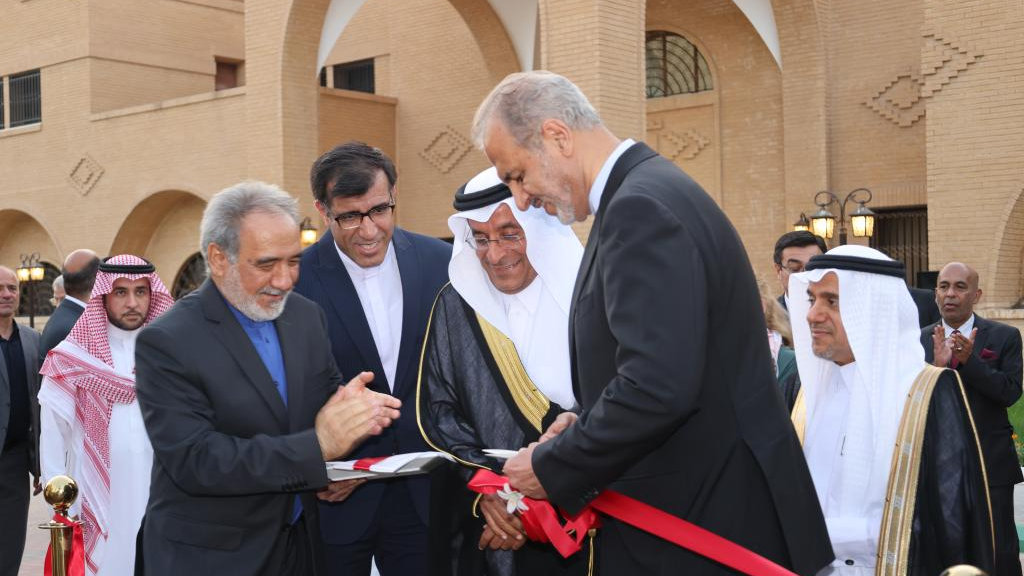RIYADH: Iran reopened its embassy in Saudi Arabia on Tuesday, several months after Tehran and Riyadh agreed to end years of antagonism under a Chinese-brokered deal.
Iranian Deputy Foreign Minister Alireza Bigdeli addressed the opening ceremony in the Saudi capital of Riyadh, highlighting the importance of the occasion for the relations between Saudi Arabia and Iran.
Bigdeli said that, with the re-hoisting of the flag of Iran in Saudi Arabia and vice versa, the cooperation between the two countries enters a new era.
He added that diplomacy is the best means for communication and dialogue between countries to reach a common understanding, stability, and peace.
The Iranian official stressed that Iran is always willing to strengthen relations with its neighbors based on the principles of good neighborliness.
Bigdeli also noted that promoting economic relations and mutual investments would lead countries to get closer to each other to achieve peace and stability in the region.
Its consulate general in Jeddah and its representative office with the Organization of Islamic Cooperation will also be reopened a day later, according to Iranian foreign ministry spokesman Nasser Kanaani.

Iranian Deputy Foreign Minister Alireza Bigdeli (Front) and Saudi Deputy Minister of Foreign Affairs for Consular Affairs Ali Al-Yousef (C) attend the opening ceremony of the Iranian embassy in Riyadh, Saudi Arabia, June 6, 2023.
In March, Iran and Saudi Arabia agreed to re-establish relations between the regional rivals whose hostility had threatened stability and security in the Middle East and helped fuel regional conflicts from Yemen to Syria.
The two countries reached in Beijing, China a groundbreaking agreement to resume diplomatic relations and reopen their embassies and missions.
According to the trilateral statement jointly issued by China, Saudi Arabia and Iran, the latter two agreed to resolve their disagreements through dialogue and diplomacy, and in light of their brotherly ties, adhering to the principles and objectives of the Charters of the United Nations (UN) and the Organization of Islamic Cooperation, and international conventions and norms.
Last month, Tehran named Alireza Enayati, a former envoy to Kuwait and a foreign ministry deputy for regional affairs, as its ambassador to Saudi Arabia, which had severed relations in 2016 after its embassy in Tehran was stormed during a protest against the execution of a Shia religious leader by the Sunni-majority kingdom.
Since the agreement in March, the two regional powerhouses have been steadily reducing tensions, which they have said will help bolster security across the region.
Mostafa Khushcheshm, an Iranian political analyst, told CGTN that the resumption of diplomatic relations between Iran and Saudi Arabia will not only bring peace and stability to the Middle East, but produce benefits for the entire world.
“We could see not only a soothing and calming of the situation of conflicts or wars in the region, but also we could see safety and security of energy parcels and supplies from the Persian Gulf, including those that come from Saudi Arabia, the UAE and elsewhere originating from the Persian Gulf region,” said Khushcheshm, adding, “That would produce interests for the entire world.”
Countries in the region have followed Saudi Arabia’s lead towards normalizing relations with Syria and its president, Bashar al-Assad.
The Kingdom has also increasingly engaged with the Iran-aligned Houthis in Yemen, where Riyadh and Tehran have backed opposing sides in the country’s civil war since 2015. The move signals that regional rifts are easing, and a permanent ceasefire in Yemen would mark a milestone in stabilizing the Middle East.
A UN spokesman on Tuesday said the re-opening of Iran’s embassy in Saudi Arabia is helpful for the region.
In reply to a question at a daily press briefing whether the re-opening of the Iranian embassy in Saudi Arabia is a positive move in the region, Stephane Dujarric, the spokesman for UN Secretary-General Antonio Guterres, said: “I think any time two countries, especially two countries with so much influence in that area – in the Gulf – are engaged in open and constructive dialogue, it is helpful to the region.”























